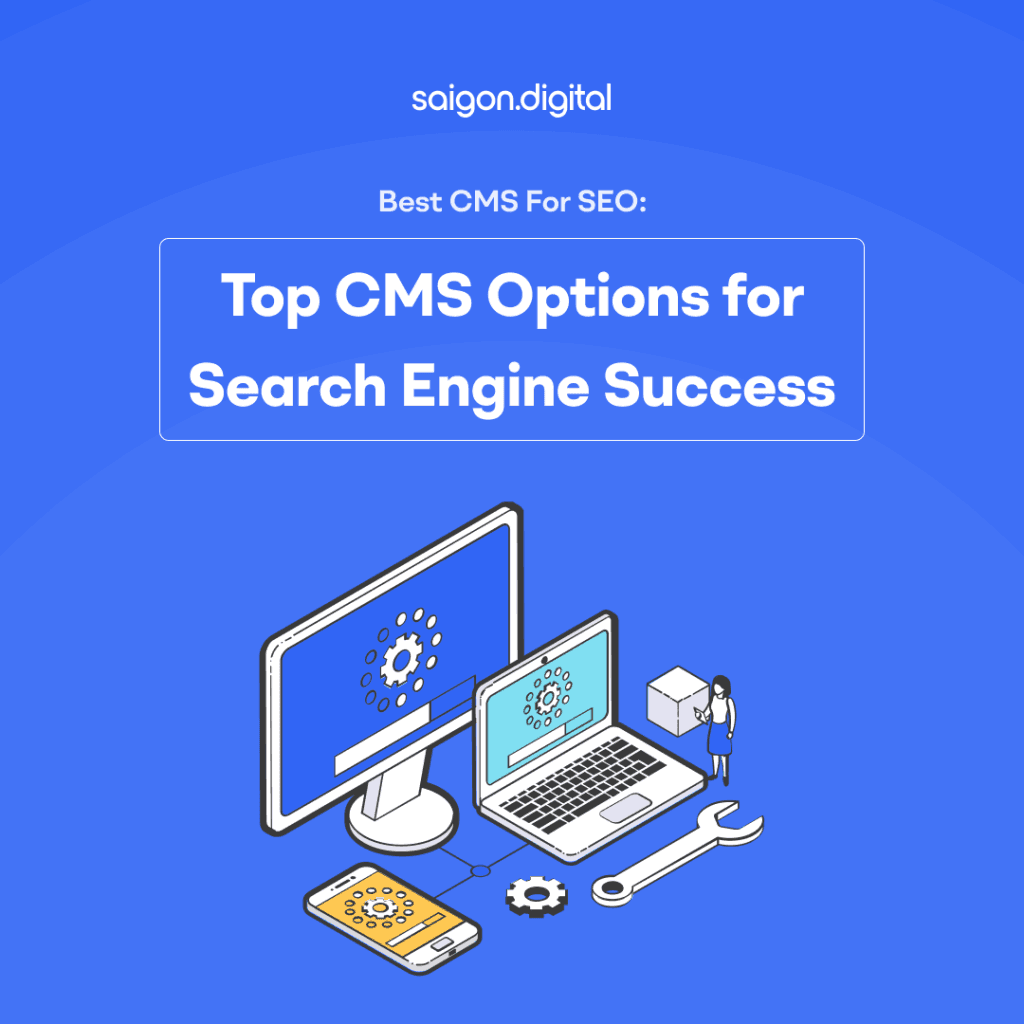
What Makes a CMS Good for SEO?
Before diving into specifics, it’s important to clarify that an SEO-friendly CMS isn't just about optimising for search engines, it also needs to be user-friendly. The top platforms come with built-in SEO tools, fast load times, clean code, and mobile responsiveness. Additionally, they should offer the flexibility to fine-tune even the smallest details.
What Features Do CMS Offer To Improve SEO?
Choosing the best CMS for SEO isn’t just about content creation, it’s about having a platform that helps you optimise everything from page speed to meta tags. With search engine algorithms becoming more sophisticated, it’s important to have a CMS for SEO that not only supports your content strategy but also assists in overcoming technical hurdles. Let's explore the most critical CMS features that can boost your SEO efforts and ensure your website stands out in search engine rankings.1. On-Page SEO Capabilities
A high-performing SEO-friendly CMS should make on-page SEO as easy as possible. This means having tools to optimise crucial elements like:- Title Tags: These provide search engines and users with insight into your page’s content. Most CMS platforms offer the ability to easily customize title tags for each specific page.
- Meta Descriptions: These brief summaries show up in search results, and a good CMS should alert you if they’re too long or too short.
- Headers and Subheaders (H1, H2, etc.): Well-organised headings enhance the readability of your content for both users and search engines.
- Alt Text for Images: Ensuring that images are optimised with alt text helps search engines understand the visuals on your page, which can boost your ranking in image searches.
2. Layout and Design Flexibility
In today’s fast-moving digital environment, websites need to be visually appealing and easy to navigate. Your CMS should provide flexible layouts and design tools that are both user-friendly and SEO-friendly. Customising aspects such as font size, colours, and media improves the user experience, which can positively impact your Core Web Vitals scores.Additionally, your CMS should enable seamless integration of rich media like images, videos, and structured data, all while adhering to SEO best practices. Choose a CMS that supports custom URLs, optimised headers, and effortless updates to meta descriptions.3. URL Slug Optimisation
The URL slug is one of the first elements search engines analyse to grasp the content of a page. Your CMS should ideally allow customisation of URL slugs, ensuring they are concise, clear, and contain your primary keywords.- Good URL Slug: /best-cms-for-seo
- Bad URL Slug: /best-cms-for-seo12345&ads9
4. Structured Data Tools
Structured data helps search engines like Google better interpret a page's content. A CMS optimised for SEO should provide tools for quickly adding structured data, improving your chances of earning featured snippets or rich results. Essential features might include drag-and-drop editors for embedding links, videos, call-to-action buttons, and more.
Structured data tools enhance search engine accessibility and the user experience. Implementing structured data is key to modern SEO, increasing visibility and relevance in search results.
5. Core Web Vitals Optimisation
Google has made Core Web Vitals an essential ranking factor, which means a CMS must help you optimise for things like load speed, interactivity, and visual stability. If your CMS is bogged down by slow loading times, you’ll not only lose users but also fall in the rankings.A best content management system for SEO will prioritise these factors by ensuring that its templates and infrastructure are optimised for speed and responsiveness, both on mobile and desktop devices.6. Technical SEO Support
Technical SEO plays a crucial role in ensuring your site performs well on search engines. Your CMS should provide tools that assist with technical issues, such as:- Page Speed Optimisation: Ensuring your website loads quickly is essential for strong SEO performance.
- Mobile Optimisation: The CMS should make it easy to optimise your content for mobile users.
- SSL/HTTPS Setup: Ensuring secure connections and redirecting HTTP to HTTPS is a must.
- Canonical Tags: Proper use of canonical tags prevents duplicate content penalties.
- XML Sitemaps: Automatically generate and update sitemaps so search engines can crawl and index your content more effectively.
- Internal Linking: A good CMS will help you create a strong internal linking structure, guiding search engines through your site and improving overall SEO.
7. SEO Tools and Extensions
Your CMS should come with built-in SEO tools or support third-party extensions to help you with everything from keyword research to tracking performance. Features like:- Keyword Optimisation Tools: These tools help you find the best keywords and track your keyword rankings.
- Schema Markup Support: Assists search engines in comprehending your content more effectively, boosting the likelihood of appearing in rich results.
- Analytics Integration: Ensure your CMS integrates with tools like Google Analytics to give you insights into how your SEO strategies are performing.
8. AI Integration
In an era where artificial intelligence is becoming more prominent, having a CMS that integrates with AI tools is a huge plus. AI-powered content optimisation tools can suggest keywords, help with content generation, and even automate on-page SEO tasks, freeing you up to focus on strategy and creativity.
9. Core Analytics and Reporting
A CMS without strong analytics is like driving a car without a dashboard. A good CMS will have built-in or integrated analytics tools to track your SEO performance, providing insights into things like:
- Top-performing keywords
- Indexed pages
- Bounce rate
- Conversion tracking
- Weekly and monthly traffic reports
This data allows you to refine your SEO strategy and identify areas for improvement.
10. Customer Support
Your CMS is the foundation of your website, so when something goes wrong, having excellent customer support is crucial. Whether you’re facing technical issues, SEO problems, or just need help setting up your site, 24/7 support from your CMS provider can save you time and keep your website running smoothly.
11. User Experience (UX) Features
While user experience doesn’t directly affect SEO rankings, it plays a significant role in how visitors interact with your site. An SEO-friendly CMS should provide features that improve user navigation, page speed, and overall usability. If users find it easy to browse your site and engage with your content, search engines will take notice and boost your rankings.10 Best CMS Platforms for SEO in 2025
1. Prismic: SEO-Friendly and Flexible CMS
As one of Saigon Digital's trusted partners, Prismic is an excellent CMS for creating SEO-friendly websites with maximum flexibility. Its headless architecture allows for easy content management and seamless integrations, allowing developers and marketers to optimise content for search engines. Prismic’s ability to structure content to enhance SEO ensures your site performs well in search rankings while offering a streamlined user experience.Why Prismic is Ideal for SEO:
- Content Customisation: Prismic allows you to easily create and organise SEO-friendly content, ensuring every element is optimised for search engines.
- Integration-Friendly: Prismic integrates with popular SEO tools, enabling continuous optimisation and analysis of your content’s performance.
- Fast and Responsive: With its focus on performance, Prismic helps ensure that your website loads quickly, a critical ranking factor for search engines.
Who Should Use It?
Prismic is perfect for businesses that need a scalable, SEO-friendly CMS that offers flexibility for developers and ease of use for content creators.
2. Sanity: The SEO-Friendly Headless CMS
At Saigon Digital, we see Sanity as the ultimate tool for clients who need a flexible, future-proof CMS. Whether they’re scaling their digital presence or managing complex content strategies, Sanity gives us the power to deliver innovative solutions built to last.As a digital agency committed to cutting-edge technology, Sanity fits into our toolkit. This headless CMS provides unmatched flexibility, giving us the freedom to manage content efficiently while delivering it to multiple platforms. Sanity’s dynamic nature allows us to craft seamless, content-driven client experiences.Why Sanity is SEO-Friendly:
- Headless Flexibility: With Sanity, we can separate content from presentation. This means we can distribute content across websites, mobile apps, and any digital platform without breaking a sweat. It’s perfect for our clients who need a multi-channel presence.
- Customisable SEO Fields: Sanity’s flexible structure allows us to create custom SEO fields for every page, helping us tailor each element for search engine optimisation. Whether it’s meta tags, structured data, or optimising alt text, Sanity has us covered.
- Real-Time Collaboration: Sanity’s real-time content editing feature allows our team and clients to collaborate seamlessly. This streamlines our workflow, making content updates faster and more efficient.
- Performance-Driven Architecture: Sanity's lean architecture and focus on performance ensure fast load times, keeping websites ranking high and providing smooth user experiences.
Who Should Use It?
Sanity is ideal for teams looking to collaborate on SEO and content management while maintaining complete control over the website’s performance and optimisation.
3. WordPress: The Best SEO CMS for Most Websites
When people think of CMS, they often think of WordPress—for good reason. WordPress powers over 40% of websites, and it’s highly regarded as one of the best CMS for SEO. Its flexibility and various powerful SEO plugins like Yoast SEO or Rank Math make optimising your website a breeze.
Why WordPress is the Best CMS for SEO:
- SEO Plugins Galore: With plugins like Yoast, you can optimise your meta descriptions, titles, and keywords in minutes.
- Customisable: WordPress allows you to tweak almost anything—perfect for on-page SEO.
- Mobile-Friendly Themes: A responsive design is crucial for SEO, and WordPress offers thousands of mobile-optimised themes.
- Fast Loading Times: Thanks to a wide range of performance-boosting plugins, you can ensure your site stays fast (and Google loves speed).
Who Should Use It?
WordPress is your go-to if you're looking for a versatile, easy-to-use platform with endless possibilities for customisation. Whether you're a blogger, running an eCommerce site, or building a company page, WordPress is the all-rounder that excels at SEO.
4. HubSpot CMS Hub: Best for Inbound Marketing and SEO
HubSpot CMS Hub is a powerful tool built with marketing in mind. It's user-friendly and fully equipped with SEO features to help you attract traffic and convert leads. HubSpot seamlessly integrates with all other marketing tools, making it a solid choice for businesses focused on inbound marketing.
Why HubSpot CMS Hub is SEO-Friendly:
- Built-In SEO Suggestions: HubSpot provides real-time SEO suggestions while you're creating content.
- Mobile Optimised: The platform ensures all pages are responsive and fast-loading.
- All-In-One Solution: With HubSpot, you get SEO tools, marketing automation, and analytics on one platform, allowing you to track the entire customer journey.
Who Should Use It?
HubSpot is the ideal choice for businesses that prioritise inbound marketing and want the best all-in-one content management system for SEO with integrated marketing tools.
5. Contentful: Headless CMS for Flexible SEO
Contentful is a headless CMS, separating content management from the front end. This gives you full control over how your content is displayed and optimised. It’s especially useful for large, complex websites that need to push content to multiple platforms.
Why Contentful is SEO-Friendly:
- Flexibility: As a headless CMS, Contentful allows you to optimise your SEO without restrictions on how the content is displayed.
- SEO Tools Integration: You can easily integrate with third-party SEO tools to help you optimise content in real-time.
- Fast Loading Times: With its ability to serve content through APIs, Contentful ensures fast loading times, a major SEO ranking factor.
Who Should Use It?
Contentful is perfect for developers and businesses that need a highly flexible CMS to deliver content across multiple platforms while maintaining control over SEO.
6. Shopify: Best CMS for SEO in E-Commerce
For newcomers to eCommerce, Shopify is frequently regarded as the top CMS for SEO in the retail sector. It offers robust built-in SEO tools alongside simple management of your online store.
Why Shopify is SEO-Friendly:
- Fast Hosting: Shopify manages the hosting, providing high-speed servers to ensure your pages load swiftly.
- Optimised for Mobile: Every Shopify theme is mobile-friendly, which means better rankings on mobile search results.
- SEO Features: Shopify handles sitemaps and offers customisable title tags, meta descriptions, and alt text for images.
- SSL Certificates: Every Shopify site has an SSL certificate, giving you a secure site that Google prioritises.
Who Should Use It?
If you're in the eCommerce space and want a platform that combines great SEO with ease of use, Shopify is a perfect choice. It’s the most SEO-friendly CMS for online stores, hands down.7. Wix: Easy to Use, SEO-Friendly CMS for Beginners
Wix is a favourite for people who want a simple drag-and-drop website builder. But simplicity doesn’t mean it slacks off on SEO. Wix has made massive strides in the SEO game over the last few years, making it the best CMS for SEO contenders for beginners.Why Wix Works for SEO:
- Built-in SEO Tools: Wix offers a built-in SEO wizard to help you with meta tags, descriptions, and headings.
- Mobile Optimisation: All Wix sites are automatically designed to be mobile-friendly.
- User-Friendly Interface: Wix's drag-and-drop design makes building SEO-optimised pages straightforward.
- Page Speed Optimisations: While it used to be slow, Wix has improved loading speeds in recent updates, giving your site a better chance in the SERPs.
Who Should Use It?
If you’re new to website building and SEO, Wix is ideal. It’s user-friendly, affordable, and has plenty of SEO tools to help you get started, making it one of the best SEO CMS platforms for beginners.8. Squarespace: A Beautiful, SEO-Friendly CMS for Designers
If you're all about aesthetics, then Squarespace might be the best content management system for SEO and design. Known for its visually stunning templates, Squarespace is a great choice for photographers, artists, and small businesses looking for style and substance.Why Squarespace is SEO-Friendly:
- Responsive Templates: Every template is fully responsive and looks great on all devices, which helps with mobile SEO.
- Simple SEO Settings: Squarespace offers easy access to title tags, meta descriptions, and alt text for images.
- Clean Code: The platform's clean and minimal code helps with site speed and performance.
- Integrated Analytics: Squarespace offers detailed analytics so you can track how your SEO efforts are performing.
Who Should Use It?
Squarespace is perfect for creatives who want a beautiful website without sacrificing SEO. It’s simple, elegant, and offers enough built-in features to keep your site ranking well.
9. Drupal: Highly Customisable and Powerful SEO Features
Drupal is a favourite among developers for its flexibility and power. It's highly customisable, which makes it perfect for those who want complete control over their website's SEO. Although it has a steeper learning curve than other platforms, its built-in SEO capabilities are impressive.
Why Drupal is SEO-Friendly:
- SEO Modules: Drupal offers several SEO modules, such as Pathauto, which automatically generates SEO-friendly URLs.
- Mobile Responsiveness: Drupal themes are fully responsive, helping you rank better on mobile search results.
- High Performance: Drupal's ability to handle large volumes of content ensures fast loading times, which is a critical ranking factor.
Who Should Use It?
Drupal is ideal for businesses or organisations with complex website needs and experienced developers who want to optimise every aspect of their SEO strategy.
10. Magento: Best CMS for Large E-Commerce Websites
Magento is a powerful CMS specifically built for e-commerce. It’s known for handling large online stores, and while it requires a bit more technical knowledge, it's incredibly SEO-friendly for those who want to scale up their e-commerce business.
Why Magento is SEO-Friendly:
- Customisable SEO Settings: Magento offers granular control over meta tags, descriptions, and URL structures, perfect for optimising individual product pages.
- Optimised for E-Commerce: The platform allows for easy optimisation of alt tags, product descriptions, and schema markup, ensuring your products rank higher.
- Mobile Responsiveness: Magento templates are mobile-friendly, which helps with mobile-first indexing.
Who Should Use It?
If you're running a large e-commerce store and need advanced features with full control over SEO, Magento is the best SEO CMS platform for you.Which CMS is Best for SEO? It Depends on You
So, which CMS is best for SEO? The answer ultimately depends on your needs. WordPress is the top choice if you’re after versatility and a massive range of plugins. Running an online store? Shopify has got you covered. For a simple drag-and-drop experience, Wix and Squarespace are fantastic options.And if you’re a more advanced user who wants total control over your SEO, Joomla might be the challenge you’re looking for.The best SEO CMS for your website is the one that fits your skills, goals, and long-term plans.Remember, choosing the best CMS for SEO is only one piece of the SEO puzzle. You must also create quality content, build backlinks, optimise your technical SEO, and more. So, choose a CMS that makes SEO easy for you, but don’t forget to work on all the other aspects of SEO.





